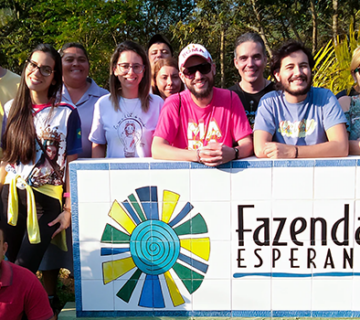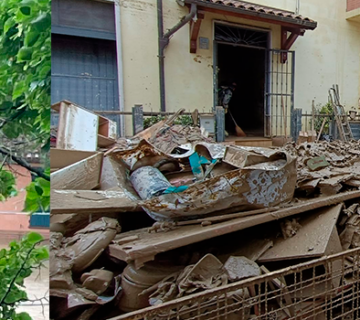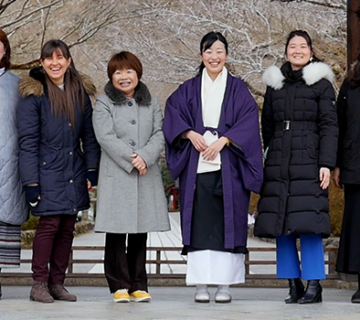 This demanding challenge, projected towards the future, towards 2009, brought an end to the big event held in Budapest. This event has showed the innovative impact resulting from fraternity lived within the economic and communications spheres, and experiences were shared showing attempts at reacting to the widespread scourge of illegality and corruption, and to the general political crisis.
This demanding challenge, projected towards the future, towards 2009, brought an end to the big event held in Budapest. This event has showed the innovative impact resulting from fraternity lived within the economic and communications spheres, and experiences were shared showing attempts at reacting to the widespread scourge of illegality and corruption, and to the general political crisis.
“Now the challenge is here for each one of us”: our countries, our cities await us!” Valeria Ronchetti and Giuseppe Di Giacomo, two of the closest collaborators of the founder of the Movement, announced: “Chiara Lubich has an idea: why not connect, in three years time, in a precise day of the year 2009, all of our cities in a network showing several fragments of fraternity already in action?”. The title of the event will be “Many cities united towards a united world”. The idea was received with great enthusiasm.
Law, communication and politics were at the centre of attention during the last part of the event.
Fraternity, as an antidote for the widespread practice of illegality and corruption, was at the centre of the round table session dedicated to law. Simone Borg, a lecturer of international law at the University of Louvain in Belgium, stated: “Justice is not merely a repression. The sense of fraternity urges one to share the burden resulting from instances of social sufferings, to work to eliminate the causes and refrain from keeping silent when faced with injustice.”
These are tough paths, which can, however, be taken. Such was the experience presented by Marisa Gentiletti from Argentina, a graduate mother of two, whose eight year old nephew disappeared all of a sudden. In a country where the law does not guarantee the immediate intervention of the police, Marisa started a big awareness campaign and concrete initiatives in order to defend minors, which involved the public opinion, institutions and the police.
Another challenge: Communication. In this crucial field, fraternity is a communications model with a united world as its objective. Human dignity is presumed in this model; the method is dialogue, and the rule is love which can radically change communication. These were some points highlighted by Manual Bru, a lecturer at the University of San Pablo – CEU of Madrid, Spain. Amongst the projects underway in this field were those presented by Maria Rosa Logozzo and Cesare Borin, who presented a low cost worldwide project of multimedia communication services to enhance cooperative development. Geert Vanoverschelde from Belgium, head of an important television production firm, showed that it is possible to bring together quality, positive programmes and high ratings from TV viewers.
 Fraternity opens new horizons also to the world of Politics. This is the experience of the Movement for Unity in Politics (Mppu), today present in 15 countries and which is defined as “an international workshop of joint political work amongst citizens, officers, researchers and committed politicians at various levels, of different inspirations and parties, who put fraternity at the basis of their lives”. Lucia Fronza Crepaz, a member of the Italian parliament and president of the MPPU, illustrated its aims and achievements. She said: “To choose universal fraternity as a political line of thought means to have the courage to go to the very roots of the crisis which engulfs politics today.”
Fraternity opens new horizons also to the world of Politics. This is the experience of the Movement for Unity in Politics (Mppu), today present in 15 countries and which is defined as “an international workshop of joint political work amongst citizens, officers, researchers and committed politicians at various levels, of different inspirations and parties, who put fraternity at the basis of their lives”. Lucia Fronza Crepaz, a member of the Italian parliament and president of the MPPU, illustrated its aims and achievements. She said: “To choose universal fraternity as a political line of thought means to have the courage to go to the very roots of the crisis which engulfs politics today.”
Amongst the various witnesses was that of Cesar Romero, a consultant for the development programmes for farmers in Paraguay, who is committed to heal the existing strong social inequalities. After several struggles and delusions, he was finally able to present the project of the Movement for Unity in Politics to the various mayors of his country. This happened during a major Latin-American meeting for mayors which took place in Argentina and was promoted by the Movement for Unity in Politics. The mayors’ responsiveness exceeded by far his highest expectations. Romero said: “Deeply touched by the spirit of this meeting, the 16 mayors from Paraguay taking part in the meeting put forward a proposal to all the other mayors for a twinning and reciprocity agreement so as to promote and sustain the sharing of local development policies. Twenty-two city councils endorsed this unprecedented event for Paraguay.”
The final choreography, “Dawn on the city”, was very significant. The city of Budapest, which lived dramatic moments of violence in 1956, fifty years later gave rise to a new impulse of renewal, fraternity and hope, which will now radiate to the hundreds of cities of all 5 continents which were represented here in this event.


 Italiano
Italiano Español
Español Français
Français Português
Português


